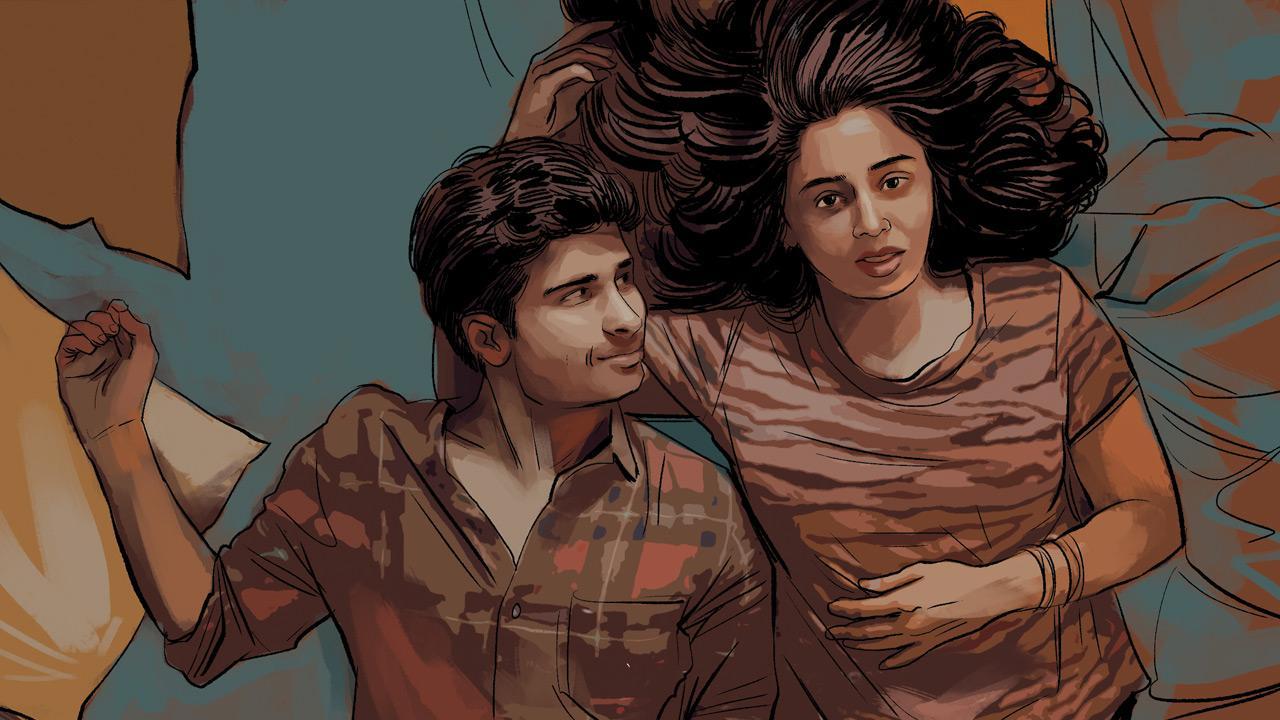The film, that dropped on the streamer Planet Marathi, a Marathi OTT platform backed by Akshay Bardapurkar, on June 30, can be seen for just Rs 50.

Illustration/Uday Mohite
June, the Marathi film, opens with a Haruki Murakami quote, making you immediately sit up. Vaibhav Khisti and Suhrud Godbole direct this debut feature, a strong, refreshing and honest film on the healing of wounded souls and broken relationships. Khisti has earlier assisted on 13 films, including Gulabjaam, Rajwade and Sons, and Axone, while Godbole has produced about eight films, including Pune-52 and Baji. The film, that dropped on the streamer Planet Marathi, a Marathi OTT platform backed by Akshay Bardapurkar, on June 30, can be seen for just Rs 50.
ADVERTISEMENT
Neel (Siddharth Menon, terrific) suffocates in small-town Aurangabad, desperate to get out. He meets the posh Neha (Nehha Pendse Bayas), from Mumbai, who visits Aurangabad while separated from Abhijeet, her husband (and Neel’s childhood buddy, Jitendra Joshi), following a trauma. She asks him to show her the town, and as the two bond, we are reminded how we can sometimes share our most intimate and horrible secrets with strangers, while unable to share these with family and friends. Each is riven by guilt: Neel confides in Neha the traumatic reason he failed in his engineering exams in Pune and returned home; and she feels guilty for destroying a life and her family. The film addresses many psychological issues, including bullying, self-harm, sexual trauma and suicide, as well as cherishing what we have and letting go of the past. The older Neha guides Neel how to let go and move on, and in doing so, she is released from her own hell as well.
What is extraordinary about the film is how beautifully it celebrates a deeply intimate man-woman relationship, that is not sexual nor even romantic. Neel and Neha are emotionally intimate; they even lie together in bed. At one moment, Neel tries to kiss her, quickly realises his mistake and apologises, realising that some relationships are valuable because some lines are not crossed. How precious such relationships can be, yet, how rarely Indian cinema discusses them sensitively.
The direction is quite strong, and courageously tackles many psychological issues that we rarely name, including pervasive moral policing, especially of women. Occasionally, it suffers from ‘debut-itis,’ as if the filmmakers put everything they ever wanted to discuss into their first film, but that’s a minor plaint. The film marvellously evokes small town detail, including its Sharda Chat Bhandar. There is a fantastic scene where, after Neha publicly slaps a man who insulted her, Neel blabbers nervously in her room, his admiration insanely fuelling his attraction towards her, and there’s a pregnant moment with a terrific frisson, before they embrace, and when she disengages herself, his eyes are still closed, to savour the moment longer. She quietly tells him, “Go. Do the right thing.” You can see the solid calibre of the directors and cast.
The gifted and grossly underutilised Menon, whose Peddlers was at Cannes, is superb as Neel, a young man filled with self-loathing. He shows a range of emotions, especially in a powerful scene, where he climbs a terrace wall at night, with a pair of scissors in his mouth, lit with a low light, whose intensity will long sear you. Bayas brings complexity to her performance, her soulful eyes reflecting emotional depths. The casting is marvellous; Kiran Karmarkar and Resham Shrivardhan, as Neel’s girlfriend Nicki, are good too. And a big fat gold medal for an Indian film acknowledging, “Some people are happy being single.” Yes, this nation of dumkopfs has finally got it!
Mahajan’s screenplay is marvellously nuanced and layered. Director of eight works, including Pune-52 and Baji, he is writer, producer and editor of June, and definitely a talent to watch. His Neel is an asshole, who is abusive towards his mother and girlfriend, and Islamophobic, yet we deeply empathise with him. I was moved to tears during a scene when Neel visits the parents of a young man who has committed suicide. Neha is remarkably calm when reacting to constant insults and taunts towards a woman who smokes and drinks, and we learn to overlook the film’s occasional trite aphorisms. The film also honours minor characters who accept second place in the love of their lives: Neel’s girlfriend Nicky, and possibly, his male friend Pritesh. It’s a bit pat that Neha’s husband coolly accepts his wife publicly hugging Neel, but again, it’s a minor quibble. Quais Waseeq’s cinematography effortlessly gets under the skin of the city and the characters. At 93 mins, Mahajan and Hrishikesh Petwe’s editing is deft. Shalmali Kholgade’s lovely songs, including Baba, Ha Vaara and Paar Geli, also propel the narrative forward. Strongly recommended.
Meenakshi Shedde is India and South Asia Delegate to the Berlin International Film Festival, National Award-winning critic, curator to festivals worldwide and journalist.
Reach her at [email protected]
 Subscribe today by clicking the link and stay updated with the latest news!" Click here!
Subscribe today by clicking the link and stay updated with the latest news!" Click here!






